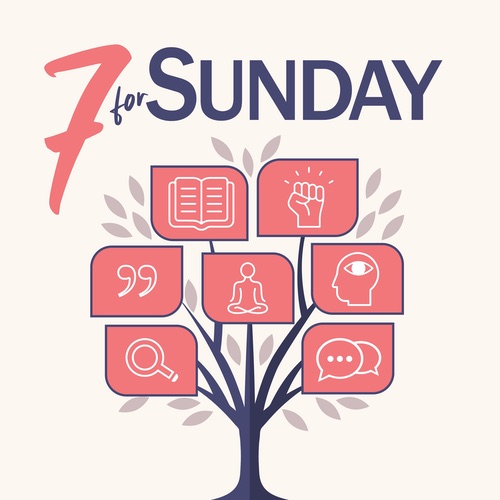Reading time: About 3 minutes, 600 words
Get 7 for Sunday in your inbox. → Subscribe here
This issue is https://7forsunday.com/81


Reading time: About 3 minutes, 600 words
Get 7 for Sunday in your inbox. → Subscribe here
This issue is https://7forsunday.com/81

I like to think that there's nothing new on my blog. (That's not a typo.) Rather, this is all just me working with the garage door up. I enjoyed this article from Holiday and it's wonderful advice, which I need to hear much much more often.
Say no. Own it. Be polite when you can, but own it.
Don’t say maybe. Don’t give a bunch of reasons (which invite an argument). Don’t push it until later.
Say NO.
~ Ryan Holiday from, https://ryanholiday.net/this-is-your-reminder-to-say-no/
My intention here with 7 for Sunday is to give you interesting things to ponder. Sometimes I worry that I might be making your life worse by enticing you with even more rabbit holes than you'd otherwise stumble upon. This item is a sort of penance then, as I hope you have built up your nope-muscle sufficiently to get through 6 more items today.
Words are sacred. They deserve respect. If you get the right ones, in the right order, you can nudge the world a little.
~ Tom Stoppard
Be sure that you've first fully assimilated the idea of 'no', above. For if you don't, you risk the mistake I make of reflexively saying 'yes' to the next thing that comes up.
We do it because to stop (or pause) after Project number-1 means we are one-hit wonders. We are dabbling. We are amateurs.
To continue, on the other hand, means we are pursuing our calling as a practice.
~ Steven Pressfield from, https://stevenpressfield.com/2023/12/having-a-practice/
We do, in fact, want to—we must—say 'yes' to some next thing.
First, master the wonderful, short, complete sentence: No. Second, immediately say yes to the correct, next thing.
The most reliable way to change your entire life is by not changing your entire life… Improve the whole by mastering one thing.
~ James Clear
It's nice to find little oases of respite. It doesn't have to be a Japanese garden, of course. You can find respite nearly anywhere.
In the 1960s, the city of Portland converted an old zoo into a 12-acre garden as part of an effort to promote peace and cultural exchange between the U.S. and Japan. The grounds have been called the most beautiful and authentic Japanese gardens outside of Japan by luminaries like Nobuo Matsunaga, the former Japanese ambassador to the United States. The teahouse, the Umami Café, strives to bring the same authentic flair to their fare. While their grassy matcha and roasted-rice teas are always on the menu, their wagashi changes with the turning of the seasons.
~ Roxanne Hoorn from, https://www.atlasobscura.com/articles/winter-wagashi-sweets-of-japan
Even better, you can create little spaces of your own.
Man has only to sink beneath the surface and he is free.
~ Jacques Yves Cousteau
There are two really important parts to good advice: The advice, and the taking of it.
Head high and […]
~ Nick Cave's mother, from https://www.theredhandfiles.com/your-mother-most-helpful-advice-gave-you/
As Cave briefly explains, his mother had previously been a font of advice, but he'd not listened. Or perhaps he wasn't ready to listen? Either way, I've totally nope never nuh-uh not me ever failed to heed words of wisdom from my mother.
What's that? What advice has she given? I think the best would be her diet book: If it tastes good, spit it out. (That's the whole book, not the title.) And her mother's best advice was: Let the young ones do it.